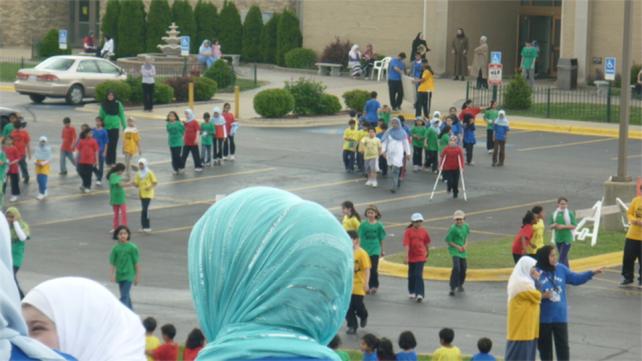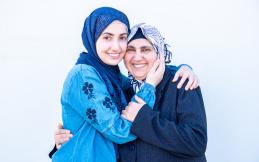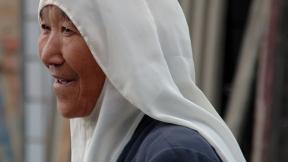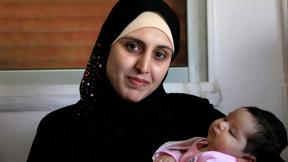
"My daughters refuse to come to the Masjid anymore," a sister recently told me. Now in their 20s, while these young women continue to consider themselves Muslims, their mother said her children have never felt a sense of belonging at any of the local mosques, for a number of different reasons. And this is despite the fact that both of their parents have been active in their local Masjid for years.
I was distressed to hear this, but hardly surprised. It's yet another anecdote I've heard about over the years. It's also a feeling I've experienced as a Muslim woman myself. Often times, the sense of alienation is not just about gender issues. Sometimes, it's related to ethnocentrism in a particular institution; other times, it's simply bad management.
Regardless of the reasons, the fact is we are losing more Muslim women from the community and the Masjids. In the long run, this is the loss of our next generation. Where will Islam stand in ten years, let alone 20 or 30, if we allow this to continue? We clearly need to retain youth in general, and girls and women in particular, if we want the Muslim community to not just survive, but truly thrive. Prophet Muhammad, peace and blessings be upon him, engaged Muslim women by not just teaching them about Islam, but making them feel validated, empowered, and included. His Sunnah in this aspect needs to be revived, as we talk of the need for other Sunnahs to be applied in our lives.
Here are some possible ways we can start helping young Muslim women feel more connected to their faith and community before it's too late:
1. Drop the dress focus
While proper dress is important for both genders, it should never be the initial focus when trying to welcome our youth to the community. It is especially important to remember that most young Muslims grow up in an environment where they are generally encouraged to dress and present themselves in a manner they please. To suddenly expect them to drop this attitude during the short time they spend in the Muslim community is unrealistic and unfair.
When it comes to girls and women, the first experience a number have had is being told by someone to "go cover your head" or getting dirty looks for the way they're dressed right when they arrive at the Masjid door. Generally, men and boys are not treated this way, although some exceptions exist.
The Prophet understood and practiced gradualism when addressing any issue. This is why he would initially tolerate and ignore certain habits and address them only after the seed of faith was planted in a person's heart. The issue of dress is no different.
2. Fix up the women's area of your mosque or Islamic center - fast
"I hate coming to this Masjid," a six-year-old girl told me once during a visit to one of the local mosques in her city. The reason: "the girls' area is always small and dark compared to the men‘s". I wonder if she'll ever bother coming back once she grows up and has the choice of going or not.
If your Masjid or center's planning meeting is coming up, make it a top priority to fix up the sisters' area this year. When I say fix up, think major overhaul, not some minor cosmetic changes. Top priorities include: a larger space that can comfortably accommodate not only women, but the children who usually accompany them; adequate lighting (a nice chandelier, like the one in the brothers' area, wouldn't hurt); putting up a bulletin board where upcoming events and activities are regularly posted and updated; clean, functioning washrooms; a good sound system to hear Khutbas and other speeches.
This is just a start and every mosque will have to discuss with its women constituents what their needs are. But these initial changes will go a long way to making women and girls feel more welcome and part of the community.
3. Eliminate ethnocentrism
Not all feelings of exclusion are related to gender for girls and women. Being left out because of differences in race, ethnicity, and language also lead to a sense of isolation. This behavior is also contrary to Islamic teachings. Make sure there is a policy of openness to all races and cultures in your mosque or community, and more importantly, watch out for ethnocentric behavior. This includes speaking in a language not everyone understands during general programs; tolerating ethnic jokes and put-downs; allowing members of only certain racial or ethnic groups to hold leadership positions or not offering translations during Islamic programs.
4. Value their volunteerism
It happened years ago but it still stings: a sister noted how in her mosque, whenever the men did anything, whether it was giving money or repairing something broken, they were praised by the institution's president. The women's contributions, on the other hand, were ignored and left unacknowledged. The sister who related this, once a very active member of the mosque, long ago left it.
It's not about seeking praise. All of us do a better job and are better committed to a cause when we get that much-needed pat on the back. While we strive to do things for the sake of Allah, we also value the recognition of our community members.
"And say: Work (righteousness): Soon will God observe your work, and His Apostle, and the Believers: Soon will ye be brought back to the Knower of what is hidden and what is open: then will He show you the truth of all that ye did" (Quran 9: 105).
5. Value their voice
How are decisions made in your Masjid, Islamic center or organization? Is there transparency and openness, or are a few of the same Board of Directors calling the shots? Who gets consulted and who doesn't?
Women are half of the community, and seeking their opinions will only enhance our programs and institutions. Allah made men and women complementary to each other. Practically speaking, that means that we cannot function without both of them. It's like trying to walk, talk, and function with only half of your body.
The Prophet also valued Shura, or consultation, and this was not restricted to men. In his life, he consulted women as well, in matters ranging from politics (consider his seeking advice from his wife during the signing of the Treaty of Hudaibiyah) to other issues.
When women are consulted, two things happen. First, their opinions are acknowledged and validated. Second, insight is gained that can only strengthen our institutions and projects. It's a win-win situation for all.
6. Establish solid youth and women's groups
A youth group has helped many a young person regain that sense of belonging they don't find outside the Muslim community. But that depends on how well organized it is, how often it meets, and if members don't just attend Halaqas and lectures, but have fun together as well. It is the safety net that often catches youth in free fall.
A young Muslim woman graduating from high school this year recently shared with me how it was her group of Muslim friends at the Masjid who had helped her get through the difficulties of being excluded in a rough public school environment over the last two years. That is exactly the kind of experience our community needs to offer young Muslims.
When it comes to women, a similar type of group needs to be set up, one that is not just focused on learning and working, but also recreation. It's important to remember that not all Muslim women have a family or a husband to turn to for social support. There are those whose families have abandoned them; divorcees; single Muslim women; students from abroad, and others for whom the community must provide a strong support network.
7. Establish avenues for participation
While cooking and serving food at functions is fine, it should never be the only opportunity for volunteerism available to sisters in the community. There are countless jobs, ranging from fixing leaky faucets to designing a newsletter to keeping the website updated that can and should be done by anyone qualified, regardless of gender.
Not only should these avenues of participation be open to sisters, they should also be made aware of them. Announcements after Juma, fliers in the women's section, and emails sent to all members should make it clear that these opportunities are open to them as well.
In addition, the board of Masjids and centers should actively try to create opportunities for new kinds of volunteerism. This can include, for example, establishing a committee to "green" the mosque, putting together a social services unit or a neighborhood relations task force. The point is to create community by engaging members in meaningful and positive ways.
8. Sports are not just for boys
In a number of cultures, and in another time, sports were the preserve of boys and men. It was considered unladylike to be on the field, kicking a ball, jumping, and getting sweaty.
Fast forward 50 years and the times have truly changed. Girls today are encouraged to get involved in baseball, soccer, rugby, volleyball, track and field, and more. In recent years, Muslim women athletes who have chosen to wear modest dress have made the news, like Ruqaya Al Ghasara of Bahrain, who won an Olympic sprint in 2008 dressed in Hijab and clothing that covered her whole body.
While some communities have caught on, most haven't. Sports night for brothers is important, but this is also true for sisters, who are more committed today than ever to not only playing sports but maintaining better health.
Masjids and Muslim communities should hold sisters-only sports nights (or days), complete with female referees at women-only gyms or gym times. Swimming is also a favorite activity and should be accommodated with all-women hours and lifeguards. But ideally, these shouldn't only be one-shot events. Teams should be formed with youth from different mosques, full-time or weekend schools, for example, and they should get together for competitive games.
9. Beyond cooking and sewing classes
Cooking and sewing are useful life skills. But if they are the sole focus of the young Muslim women's programs in your community, then it's time to expand the repertoire of activities and classes. Most Muslim youth attend public school, where girls are encouraged to pursue non-traditional activities. They naturally walk into the Masjid hoping they'll find something similar to attract their interest and attention. When they don't they will stop coming.
That doesn't mean we should drop the traditional fields. It just means there needs to be more variety and it should be made open to both genders.
10. Master the art of explanation
It's not just non-Muslims who often have negative impressions of Islam. Many times, it is Muslims as well. Much of that is due to two major problems: ignorance of Islamic teachings and Muslim behavior that contradicts Islamic principles. The "woman issue" is a classic example of that.
Countless Muslim women and girls have decided to stay away from the local mosque or community because of its (mis)understanding of Islam and women's rights. Other times, it is the way this aspect of the faith is explained that is a turn off.
This is why it is critical that every Muslim community leader, activist, and teacher master the art of being able to explain women's issues in a satisfactory way. It doesn't require a PhD in Islamic Studies, with a specialty in Muslim women's issues. It just means sitting down and reading a brief and concise book like Gender Equity in Islam, for instance, and trying to offer a culturally appropriate explanation of Islamic teachings.
It is important to remember that we are living in a culture where most of the time, any kind of boundaries or limitations are considered unnecessary restrictions. This is why it is so hard for many young Muslims, for example, to understand why there are restrictions on dress and behavior between men and women. Hijab is seen as an attack on the freedom to dress as one pleases; not being allowed to date is seen as yet another example of Islam's "restriction-heavy" approach to issues. But proper understanding of not just basic teachings, but also, current societal trends, helps us offer explanations that will insha Allah bring them closer to the faith, not drive them away from it.








Comments
taif brother
Absolutely agree with you. I will make another observation though if muslim men gave sunnah an importance and adherence their women folk wouldn't feel so targeted. Aide your women to stick to hijb and niqab by wearing sunnah dressing urself. If you stic ti bare minimum , your charges will stick to les than that. Be a rolemodel not just when accepting leadership role but also by going out of your way in sunnah. Thats will cure half of the issue of western born muslim girls.
Location
As-salaam alaikum sister,As an European-American convert to Islam of 11 years, who came to Islam through a very wise door, may Allah be pleased with him, I have to agree with you and commend you for your article. The idea that our Prophet, saaws, would have treated the blessed ladies of his companions with the manner that women today are treated in our communities is absurd. The issue goes beyond masjid politics into the home where many assume that their culture's pre-Islamic practices are Islamic practices. Also, the sunnah of someone who came after the prophet, saaws, is not the sunnah. Our children learn their deen and their earliest spiritual teaching not from an imam, but from their mom. These ladies need to be rooted in their community in order for their belief to be nurtured, grown and then passed down to their children, in'shallah. In our local community, my wife rarely is inspired to attend the masjid. When she is, she is reminded again why: there are so few women present unless it is a large function. There are not many activities happening that are inviting to a young married lady. In her previous town, where she lived before marriage, the masjid encouraged both men and women to participate and their were many events that engaged both her desire to study Islam, but also spoke to her need to be involved with other like-minded sisters. It is our Prophet, saaws, who said, "We become the company that we keep." It is to this that I hope our masjids will not only make space for our sisters, but also create many ongoing programs and opportunities for our sisters to feel a part of their community. If so, this will, in'shallah have a lasting impact on the future generations to come.
Location
To the brother who just posted above. If you are from Taif, then you obviously do not understand the context of what is being talked about in this article. You don't live in the West and you don't understand the environment that is being discussed here. It is not calling for "modernizing" or "liberalizing" Islam. It is simply calling for what Allah has already allowed, and what already took place in the life of Prophet Muhammad, peace and blessings be upon him. And that was women's attendance at mosques (which was allowed), and their participation in activities outside the home within a proper context (e.g. the Masjids) Your putting down Gender Equity in Islam and describing it as "fallacies" shows your own lack of understanding, and perhaps your own cultural biases about women's issues. May Allah guide you and men like you to be just and truly understand the Quran and Sunnah of our beautiful Rasul (Allah's peace and blessings be upon him), who was not only just toward women, but who understood how to communicate the message of Islam to them in a way that was neither insulting nor demeaning, with wisdom and beautiful preaching.
Location
Alhamdolillah. What a truly excellent and inspiring article. I fully agree with the writer. Allah made Islam for all times, yet so many Muslims refuse to adjust to changing times and this drives our young people away, especially our girls. I heartily recommend this article to everyone. Women are more than the hijab, more than the restrictions that seem to choke us at times. The hijab is a sign of faith and has to come from within. Rules imposed before one is ready only leads to rebellion. Alhamdolillah I wear the hijab, but did not start till I was about 20, and even so it was a struggle. Just now at age 37 and I at more peace with it. Even now I look for more comfortable and practical hijabs. Please fellow Muslims worry about your own souls instead of nitpicking others and restricting them.
Location
Alhamddulillah, wasalatu wasalam 'ala rasulillah (SAW). The writter of the article masha Allah has made I believe a sincere attempt in giving solutions to the problem of keeping young muslim women to faith and community. However, in Islam nothing is done with mere intellect and assumption as the religion is a revealved religion in all it's ramifications, so solutions to problems must be wholly derived from Quran and sunnah. Some fundamental issues cannot be neglected though approach should be gentle, like talking about the Hijab. A new or young muslim woman must be made to understand the her salah cannot be accepted without fully covering her body (except face and hands), this means she must necessary use the proper hijab to the masjid.I quite appreciate the context of the environment from which the writter was writting but the Rasul (SAW) said: "A time will come when holding on to islam will be like holding on to red hot coal", he also said: "Islam began as something strange and will leave as something strange. So glad tidings (of a tree in paradise) to the strangers". We are in that time now when it's difficult to hold on to islam and it's something completely strange, so anyone today who says he or she is practicing islam even in the best of Islamic countries today and does not unusually feel strange in most part of his islam should further look inwards and will realise there are fundamentally wrong things about his islam. This is because most of the people have neglected the detailed teachings of Islam, so for my sisters in the US, seeking to feel free like the rest of the society is impossible if you're to practice real islam, you must necessary feel estranged, this is Islam today. Issues of sports should not be something to focus on and if it's to be done, then it must completely adhere to the teachings of the deen. Also we should be careful about issues of mosque decorations as this is one of the signs of the last hour as the rasul said, this is not to say the mosques should be shabby.For Allah's sake the women should appreciate their roles and limitations in the islamic society and expunge western ideas from their brains,I have read the book quoted by the author of this article (Gender equality in islam) and it is a complete bunch of fallacies seeking to misguide people and make Islam more appealing to muslims with liberalist ideas and the western world in general. We should try to take our islam from the teachings and ways of the pious predecessors starting with the companions of the prophet, who lived with him, learnt from him and without whom islam could not have been transmitted to us. Anyone who differs from the believes and ways of the companions of the prophet is on a path other than the true path of Islam. This is the clear meaning of the hadith of the saved sect.My final advice is that every muslim should look into him or herself and search for sincerity to Allah, ask for Allah's true guidiance and not turn his or her back on the true guidiance when Allah shows it to him or herSubuhanakallahumma wabihamdik Ashhadu Allaa ilaaha illallahu wa astagfirka atuubu iliak
Location
Add new comment